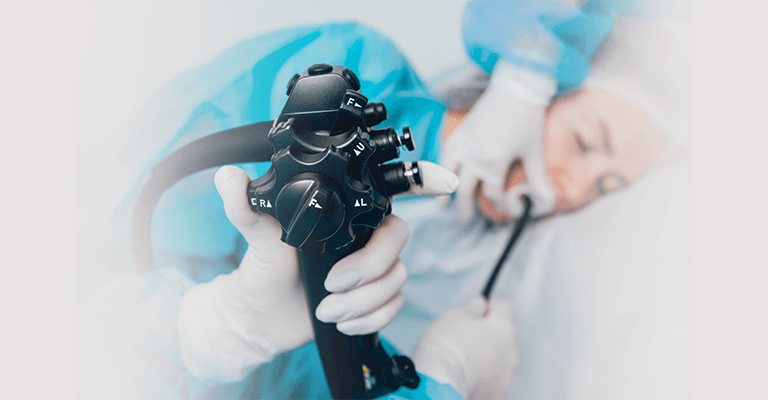

Gastroscopy
Gastroscopy is a type of endoscopic examination that provides a gastroenterologist with insight into the condition of the esophagus, stomach, and duodenum (upper part of the small intestine). The procedure is performed using a flexible endoscope called a gastroscope.
If deemed necessary by the doctor, gastroscopy can also involve a series of minor procedures such as:
- Biopsy (taking a small tissue sample)
- Polypectomy (removal of polyps, growths on the mucous membrane of the esophagus, stomach, or small intestine)
- Hemostasis (stopping bleeding if an ulcer is present)
Why is gastroscopy significant?
Since the organs of the digestive system cannot be examined using ultrasound, gastroscopy is often the preferred initial method for detecting potential disorders. In exceptional cases, X-ray imaging may be recommended, but gastroscopy has the advantage of being more precise in diagnosing diseases, allowing tissue sampling, and posing no risk of radiation.
When is gastroscopy performed?
Patients are advised to undergo gastroscopy for several reasons. It is most commonly recommended for those experiencing symptoms such as:
- Digestive problems of any kind
- Frequent vomiting (especially vomiting blood)
- Chronic stomach pain
- Chronic presence of heartburn and burning sensation in the esophagus and throat
- Difficulty swallowing
What diseases can gastroscopy detect?
- Esophagitis (inflammation of the esophagus)
- Barrett’s esophagus
- GERD (gastroesophageal reflux disease)
- Gastric and/or duodenal ulcer
- Gastritis (inflammation of the stomach)
- Duodenitis (inflammation of the duodenum)
- Stomach and esophageal cancer
- Hiatal hernia
- Various other rare conditions
What does the preparation for gastroscopy involve?
Your doctor will provide you with all the instructions, but the most important rule is to refrain from eating and drinking for a minimum of 6 hours before the gastroscopy.
How is gastroscopy performed?
The procedure itself typically lasts 10-15 minutes, but the duration may be extended if additional procedures are performed.
During the procedure, patients are advised to maintain calm and gentle breathing.
An anesthetic spray may be applied to the throat area, where the endoscopic tube will pass, to numb the area. Sedation may also be administered.
Some patients may choose to undergo gastroscopy without sedation, so if this applies to you, please discuss it with your doctor before the procedure.
During the procedure, you will need to lie on your side. The doctor will ask you to place a plastic mouthguard between your teeth to protect them and prevent you from biting the endoscope.
The doctor then carefully inserts the gastroscope through your mouth and into the esophagus, stomach, and duodenum. There is no need to worry as modern gastroscope instruments are quite thin.
A video camera at the tip of the gastroscope sends images to a computer monitor, allowing the doctor to identify any abnormalities in the esophagus, stomach, and duodenum. The air passing through the channel in the endoscope may cause you to feel bloated or have the urge to belch.
The doctor may also take one or more small tissue samples (biopsies) from the inner lining of the stomach or intestines, depending on the purpose of the test and what they want to examine. This is completely painless. The biopsy samples are sent to the laboratory for further analysis.
Finally, the doctor carefully removes the gastroscope.
What should I expect after gastroscopy?
If sedation was used during the procedure, discomfort is minimized. However, it is advised to have someone accompany you and drive you home afterward.
After the procedure, you may experience mild throat discomfort for up to 24 hours.
Note:
After receiving sedation, it is important NOT to:
- Drive a vehicle for at least 24 hours
- Operate machinery for at least 24 hours
- Engage in any other activities that may pose a risk.
Are there any complications?
When this procedure is performed by highly skilled experts who are experienced and properly trained, such as gastroenterologists at Tesla Medical Clinic, the risks of complications during gastroscopy are minimal.
Complications of gastroscopy, similar to any other procedure, may include:
- Perforation of the stomach or intestinal wall
- Bleeding
- Choking
Fortunately, these complications are extremely rare in practice.
Since gastroscopy may involve the use of sedatives or anesthetics, risks in this case are also uncommon but can include difficulty breathing and abnormal heart rhythm.





